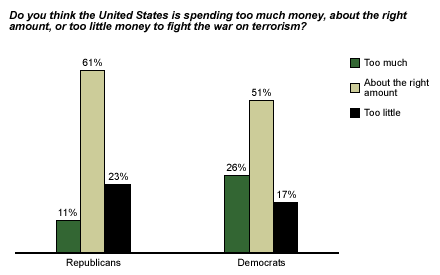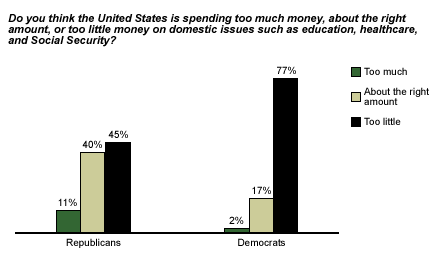President Bush's call to create a Cabinet-level Department of Homeland Security with an estimated budget of $37 billion and 169,000 employees, stands as the clearest example of a shift in the federal government's post-Sept. 11 spending priorities. Like any military effort, the war on terrorism requires significant government funding. The results from a Gallup poll conducted just prior to Bush's call to create the new defense agency indicate that more than half of Americans think the government is spending the right amount on the war on terrorism -- but a majority also think it is spending too little on domestic issues. The public places less priority on holding down the budget deficit than it does on maintaining funding on these two fronts.
The May 28-29 poll* shows that 53% of Americans think the U.S. government is spending the right amount of money to fight the war on terrorism, while 20% think it is spending too little and another 20% of Americans think the government is spending too much. Democrats are more likely than Republicans to say the United States is spending too much on the war on terrorism, 26% to 11%.

When asked a separate question about domestic spending, just 27% of Americans said the United States is spending the right amount when it comes to such issues as education, healthcare and Social Security. In fact, a majority (63%) says that there is too little spending in these areas, while only 6% say there is too much. Again, there is a clear partisan difference. More than three-quarters of Democrats (77%) say there is not enough spending on domestic issues, compared to less than half (45%) of Republicans who think so.

Holding down the budget deficit is clearly not the public's top priority at this time. When asked to choose which is more important, increasing spending on the war on terrorism or holding down the budget deficit, 54% chose increasing spending for the war and 38% chose holding down the deficit. A similar question asked Americans to choose between the importance of holding down the budget deficit and increasing spending on domestic issues. Increasing domestic spending was chosen as more important by 65% of Americans, compared to 28% who chose holding down the deficit.
Again, partisan differences are evident in the data. When asked to choose between spending for the war and holding down the deficit, Democrats are significantly more likely than Republicans to come down on the side of the deficit (43% to 31%). The pattern reverses when domestic spending is involved. In that case, Republicans are more likely to choose holding down the deficit, 38% to 16%.
*Results are based on telephone interviews with 1,003 national adults, aged 18 and older, conducted May 28-29, 2002. For results based on the total sample of national adults, one can say with 95% confidence that the maximum margin of sampling error is ±3%.
